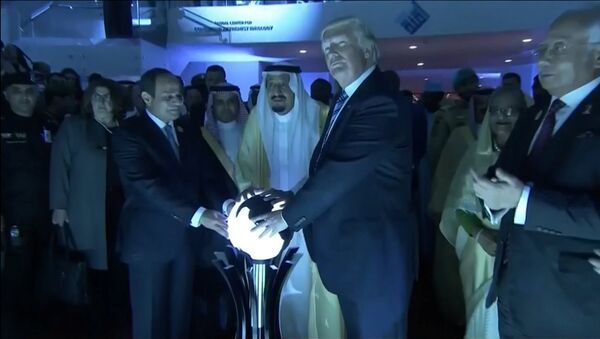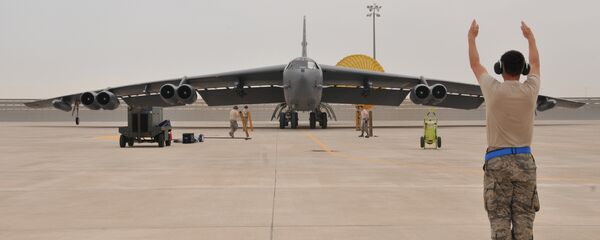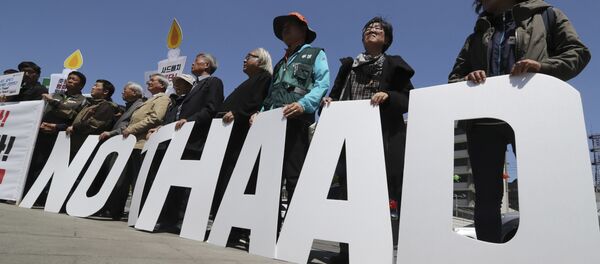“What the Saudis and the administration did is put together a notional package of the Saudi wish list of possible deals and portray that as a deal. Even then the numbers don’t add up. It’s fake news,” Bruce Riedal wrote in a column for the Brookings Institution, where he is a senior fellow.
“There is no $110 billion deal,” he said. Prior to Brookings, Riedal worked at the CIA for 29 years and counseled four US presidents during his time on the White House National Security Council.
According to the Pentagon's public materials reviewed by Sputnik, there is no pending deal or combination of agreements adding up to $110 billion between the US and Saudi Arabia.
Trump’s proposed sale of the THAAD missile defense system to Riyadh was actually something former President Barack Obama agreed to “in principle” back in 2015. The supposed sale of a fleet of 150 Black Hawk choppers is also “old news repackaged,” Riedal said. The Saudis have communicated interest in these purchases in recent years, but nothing has come of it. That’s still true today, according to Riedal.
Further, the four “multi-mission surface combat vessels” included in the supposed deal to boost Saudi Arabia’s naval capabilities are an international export version of a current US frigate. At this stage, the only thing Washington could export to Riyadh would be the ship’s blueprints, because the actual ships don’t exist yet, Riedal continued.
Lastly, the expert contended that depressed oil prices, in tandem with the financial drain of funding the Yemen war, render it “unlikely” Riyadh has the cash for any such deal.
Citing the White House, however, were Reuters, which described the arrangement as “sealed,” and CNBC, which said the agreement was “worth $350 billion over ten years and $110 billion that will take effect immediately.” Other outlets followed suit, and Boeing, Lockheed and Raytheon have publicly claimed that they would stand to benefit from the potentially lucrative deal or series of deals.
The Pentagon’s arms exporting agency maintains that the $110 billion sale is “intended,” meaning the exchange has yet to go through the many rigors of finalizing the transfer of weapons from the US to foreign nations.
First, Congress must receive notice of the intended sale. Next, lawmakers have 30 days to allow the deal to go through; promises from the State Department, Defense Department and the White House to sell weapons can be halted by Congress. According to the Defense Security Cooperation Agency, Congress has to pass a bill “expressing its will on the sale” and be able to secure enough votes to beat a potential presidential veto in order to block arms sales.
In addition, lawmakers remain “free to pass legislation to block or modify an arms sale at any time up to the point of delivery of the items involved.”
On Monday, DSCA delivered notices to Congress of the Trump administration’s intended sales of radar systems. But the deal amounted to a miniscule fraction of the widely publicized $110 billion deal.
There are currently three proposed sales to the Kingdom that have been sent to Congress, worth a total of $1.6 billion. A majority of that, $1 billion, is only for services, not high-tech weaponry or THAAD missile defense systems, contrary to media reports.
The DSCA announced on June 5 that the “sale” of $662 million worth of radar equipment to Riyadh is a "notice of a potential sale required by law and does not mean the sale has been concluded."
On June 2, DSCA delivered a notification to Congress of a proposed $750 million sale of services to the Royal Saudi Air Force. But that doesn't include any weapons or missiles. Instead, the blanket order training program ordered by Riyadh "includes, but is not limited to, flight training, professional military education, specialized training, mobile training teams, and English language training," according to DSCA.
The only other recent item included on DCSA's list of Major Arms Sales is from May 23, when a training program requested for Saudi Arabia's navy. The estimated value of the deal is $250 million.






